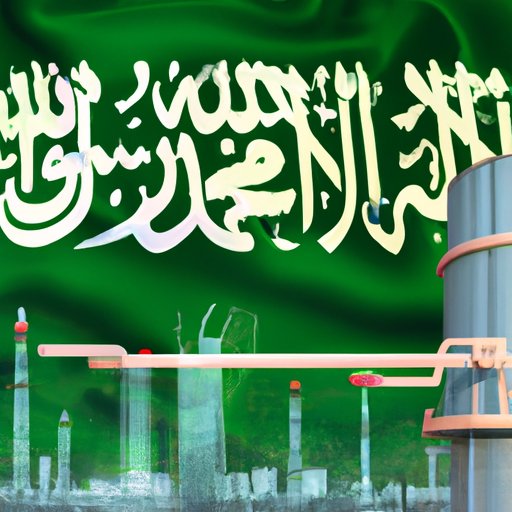Introduction
Oil production is a major factor in the global economy, and the world’s top oil producers play an important role in shaping the international energy market. This article will explore the world’s largest oil producer, Saudi Arabia, and the impact it has on the global economy and environment.

Background Information on World Oil Production
Oil has long been a major source of energy for the world. According to the U.S. Energy Information Administration (EIA), the United States alone consumed 19.5 million barrels of oil per day in 2018. Globally, total oil consumption was estimated at 100.3 million barrels per day in 2018. The EIA also estimates that the world’s proven oil reserves totaled 1.7 trillion barrels in 2018. With such large numbers, it’s clear that oil plays an essential role in the global economy.
Overview of Global Oil Production and Its Impact on the World Economy
As of 2019, the world’s top five oil producers are Saudi Arabia, Russia, the United States, Iraq, and Iran, respectively. Together, these five countries account for about 45 percent of the world’s total oil production. The rest of the world’s oil production comes from other countries, such as Canada, Mexico, and China. As the largest oil producer, Saudi Arabia has a major influence on the global energy market and world economy.
Comparison of the World’s Top Oil Producers
Saudi Arabia is the world’s largest oil producer, with an estimated 12.3 million barrels of oil produced per day in 2019. This puts it ahead of Russia, which produces 11.2 million barrels per day, and the United States, which produces 10.9 million barrels per day. Iraq and Iran round out the top five oil producers, producing 4.7 million and 4.1 million barrels per day, respectively.
How Has Saudi Arabia Maintained Its Position as the World’s Largest Oil Producer?
Saudi Arabia has been able to maintain its position as the world’s largest oil producer due to a combination of historical context, political factors, and economic factors. Historically, Saudi Arabia is home to some of the world’s oldest oil fields, with some dating back to the 1930s. Politically, the country has strong relationships with the United States and other Western powers, which has allowed it to maintain its position as the world’s top oil producer. Economically, the country has invested heavily in oil production and infrastructure, which has allowed it to increase its production capacity over time.
What Role Do Oil Producing Countries Play in the Global Energy Market?
The role of oil producing countries in the global energy market is critical. They provide the supply of oil needed to meet global demand. In addition, they play a key role in setting the price of oil, as they are able to influence the market through their production decisions. For example, if the supply of oil is low, the price of oil will rise, and vice versa.
Exploring the Potential of the World’s Oil Reserves and Their Impact on the Environment
Despite being the world’s largest oil producer, Saudi Arabia only holds about 16 percent of the world’s proven oil reserves. The remaining 84 percent of the world’s oil reserves are held by other countries, such as Venezuela, Canada, and Iran. As technology advances and more of these reserves become accessible, the potential for increased oil production is great. However, increased oil production also has environmental implications, as the burning of fossil fuels contributes to climate change.
Conclusion
In conclusion, Saudi Arabia is the world’s largest oil producer, accounting for over 12 million barrels of oil per day. The country has been able to maintain its position as the top oil producer due to a combination of historical, political, and economic factors. Other major oil producing countries, such as Russia and the United States, also play an important role in the global energy market. Finally, exploring the potential of the world’s remaining oil reserves will be key to meeting global demand in the future, but doing so will require taking into account the environmental impacts of increased oil production.


